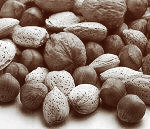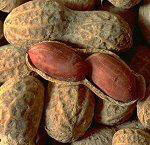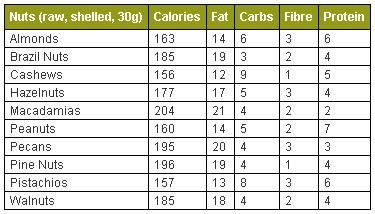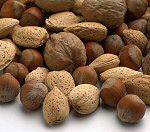 Imagine a food so packed with fibre, protein, phytochemicals, amino acid, minerals and vitamins that it could lower your cholesterol, reduce your risk of heart disease, cancer, stroke and diabetes, and even help you to lose weight ... wouldn't you want to try it? Ummm...ever heard of a walnut?
Imagine a food so packed with fibre, protein, phytochemicals, amino acid, minerals and vitamins that it could lower your cholesterol, reduce your risk of heart disease, cancer, stroke and diabetes, and even help you to lose weight ... wouldn't you want to try it? Ummm...ever heard of a walnut?
Or any other nut for that matter. Pecans, pistachios, pine nuts, almonds, Brazils, cashews, hazelnuts, walnuts, macadamias, chestnuts, and peanuts are all amazingly good for you - in spite of their high fat content. (Although - little known fact - the peanut is technically a legume as it grows in the ground and not on a tree). A small handful of nuts a day should be a part of any healthy diet read on to find out why.
What's in a nutshell?
The protein content of nuts is around 10-25%, making them a great alternative to meat as a source of protein. And because it's plant protein, there's no cholesterol and very little saturated fat involved.
Nuts are still high in fat however - up to 73% of a nut can be fat - but the fat is monounsaturated and polyunsaturated fat, or "good" fat, which helps to lower cholesterol levels and reduce the risk of heart disease. Nuts are also an excellent source of omega-3 fatty acids, which are vital for good heart and body health.

The carbohydrate content of most nuts is fairly low, at around 14%, and is largely fibre-based. Each small serving of nuts gives you around 1g of fibre, the equivalent of a slice of whole-grain bread or one banana.
Nuts also contain a glut of health-enhancing vitamins, minerals and phytochemicals including flavonoids - which help to reduce the number of free radicals in the body - isoflavones, phenolic compounds, ellagic, amino and folic acids, vitamins E and B6, magnesium, zinc, iron, calcium, copper, selenium and potassium.
Health nuts
As well as being a great source of daily nutrients, nuts also help to prevent a number of serious diseases and health complications including heart disease, cancer and diabetes.
Heart health. Walnuts and pecans have been the nutty centerpiece of two separate Loma Linda University studies investigating the association between nut consumption and heart health. In both studies it was shown that a nut-enriched diet could dramatically reduce overall cholesterol levels, in some cases more than twice as much as a traditional cholesterol-lowering diet. The "stickiness" in the blood vessels which restricts blood flow was decreased on both nut-enriched diets, improving the elasticity of damaged artery linings and lowering the risk of heart disease by up to 25%.

The high levels of unsaturated fat in nuts is largely what helps to lower cholesterol levels, but other nutrients in nuts also play a role. For example, the protein in nuts is high in arginine, an amino acid that relaxes the blood vessels, allowing blood to flow more easily through the arteries. High levels of Vitamin E help to prevent the oxidation of cholesterol, which contributes to fatty buildup in the arteries. Folate lowers homocysteine levels in the blood (high levels of homocysteine are a strong predictor of heart disease), while calcium, magnesium, and potassium lower blood pressure.
Cancer. The high levels of unsaturated fat and plant protein in nuts that help protect against heart disease also help protect against cancer. To add to that, the amino acid arginine present in nuts has been shown to inhibit tumor growth and enhance general immunity.
The selenium in nuts is also a powerful antioxidant which protects against cancer and heart disease. Brazil nuts are possibly the best cancer-combatants due to the fact they contain around 2,500 times as much selenium as any other nut.
Walnuts and pecans also contain ellagic acid which has been shown in laboratories to inhibit  the growth of tumors caused by certain carcinogens. Ellagic acid is currently used as an alternative and complementary medicine in the treatment of cancer.
the growth of tumors caused by certain carcinogens. Ellagic acid is currently used as an alternative and complementary medicine in the treatment of cancer.
Many researchers also believe that vitamin E helps to protect against some cancers. Nuts - and almonds in particular - are an excellent source of this potential cancer-combating vitamin. A 30g handful of almonds provides one-third of the recommended daily intake for vitamin E.
ÂÂ
Diabetes. Results from a comprehensive Harvard study of 83,000 women over 14 years showed that women who regularly consumed at least 30g of nuts per week were almost 20% less likely than women who rarely ate nuts to develop Type 2 diabetes. Similar results were found for women who ate peanut butter five times a week. However, researchers also noted that participants who included nuts or peanut butter in their diets also had healthier diets overall, eating less meat, less trans fat and fewer highly-refined grain foods. They also smoked less and exercised more than non-nut-eaters. These lifestyle factors dramatically reduce the risk of Type 2 diabetes in both men and women.
Nuts can also help in the treatment of diabetes. A 1999 study of vegetarian diets showed that vegetarian foods, including nuts, lead to improved control of blood glucose, lower insulin requirements and better weight control for people with diabetes.
Nuts and weight loss
The only bad thing about nuts is their high calorie count. If you were on a 2000 calorie-a-day diet, and ate nothing but raw almonds for a day, you could only have twelve small handfuls - and your fat intake would be 165% over the limit!

But if you only eat a small amount, the benefits of nuts outweighs their fat content. In fact, eating nuts may even help you lose weight. A study conducted at Brigham and Women's hospital in Boston showed that overweight participants who ate a moderate-fat diet (39% of calories) that included 85g of almonds a day, lost more weight than those participants on a low-fat diet (18% of calories) that did not include almonds.
The trick to eating nuts without overdoing the fat is to measure out a 30g serving size once or twice. After a couple of times measuring you'll know approximately how many nuts constitute a handful - then you just have to stick to that sized handful!
Try these tips for incorporating nuts into your diet:
* Instead of simply adding nuts to your diet, eat them in place of other snacks; that way you won't add extra calories.
* Weigh the nuts before you eat them, at least at first. Find a convenient sized container to store a single serving in.
* Choose raw nuts. If you opt for dry-roasted or oil-roasted nuts, be aware that the calorie and fat content will usually be higher. If nuts are roasted with hydrogenated oil the quality of the fat will be compromised. Also remember that added salt may not be good for those with high blood pressure.
* Avoid sugar-coated or chocolate-dipped nuts, as these add unnecessary fat calories.
* Buy nuts in the shell; having to crack them open will slow your eating down!
* Coconut and palm nuts are exceptions to the healthy nut rule as they contain high levels of saturated fats.

